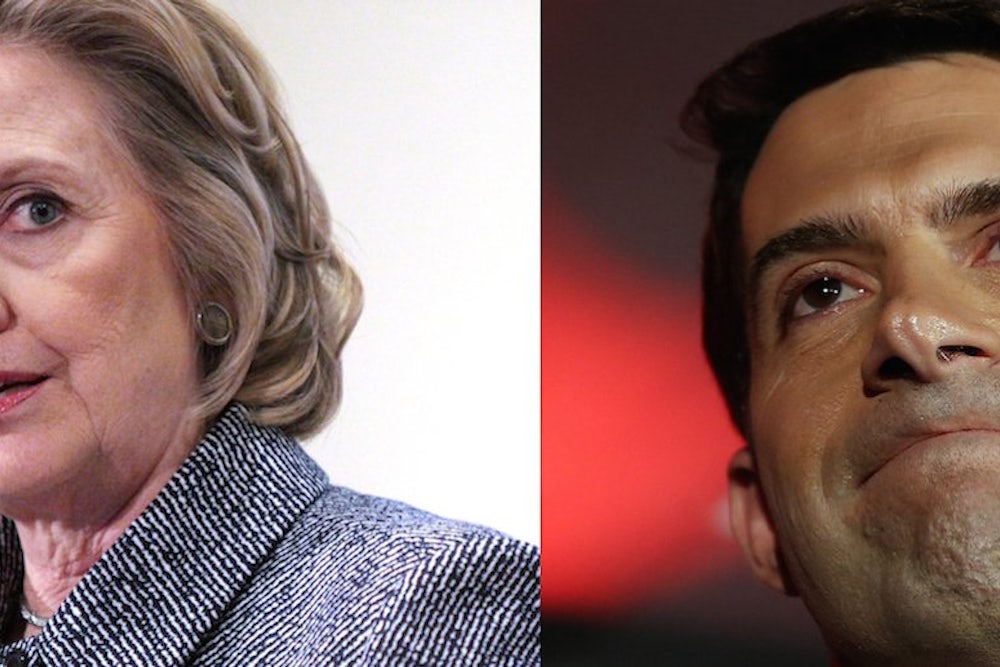When, after several days of stonewalling, Hillary Clinton finally answered questions Tuesday about her email and record-keeping practices while she was secretary of state, she prefaced her remarks with a stinging condemnation of Senate Republicans, who are embroiled in a mail-related scandal of their own.
“One has to ask, what was the purpose of this letter?” Clinton asked, alluding to an open letter 47 Republicans “sent” to Iranian officials this week in an attempt to sabotage President Barack Obama's negotiations over a nuclear deal. “There appear to be two logical answers. Either these senators were trying to be helpful to the Iranians or harmful to the commander-in-chief in the midst of high-stakes international diplomacy.”
Both Clinton's email and the GOP letter have invited severe recriminations. But at the very moment Clinton was absorbing her political lashes—acknowledging it would have been “smarter” to use a State Department email account for State Department business, and admitting that she’d deleted tens of thousands of emails she’d deemed personal—Republicans presidential hopefuls outside the Senate were doing something like the opposite: rushing to align themselves with the senators who faced accusations of treason.
I support the letter sent by @SenTomCotton & his colleagues to Iran warning them that Congress will have to approve any nuclear deal.
— Gov. Bobby Jindal (@BobbyJindal) March 10, 2015I would be proud and honored to sign the letter @SenTomCotton has put forward on Iran. http://t.co/9baorGM0iq
— Rick Perry (@GovernorPerry) March 10, 2015I commend @sentomcotton for his leadership on misguided Iranian negotiations.
— Rick Santorum (@RickSantorum) March 10, 2015That both stories nominally involve mail seems at a glance like the most superficial of similarities. Clinton’s email cache was vast and secretive; the GOP letter—singular, if you don't include its translation into Farsi—was printed on stationary, and produced for public consumption. But the communications tools themselves aren’t the issue. Instead, both stories underscore how those tools can encourage and amplify reactionary political tendencies. Together they epitomize the long presidential campaign that awaits us.
Clinton’s best defense of funneling all of her emails—personal and official—through a single account, and maintaining it on a server under her control, was to identify a catch-22. Clinton claims she handed over all official emails and deleted all personal ones and that we just have to trust she’s telling the truth. That sounds incredibly shady until you consider the fact that the system her critics would have prescribed for her—using a government email account for official business, and a personal account for private matters—contains the same loophole. Many thousands of government officials maintain separate accounts, but for records-keeping purposes we generally have to take them at their word that they’re not conducting official business on personal accounts. If Clinton had used two separate accounts, it’d be just as difficult to verify that the government controlled all of her official correspondence. Compliance in both instances is rooted in trust.
But Clinton's email system, in contrast to the standard protocol, gave her the power of hindsight: to determine, after her tenure at State, which correspondence to make public, rather than making that decision in the heat of public service. Her decision to delete all the emails she deemed private conveys, at least, a reflexive secrecy developed over decades of political opponents' rifling through her personal life looking for salaciousness.
Whether she genuinely enjoyed the simplicity of using one device or not, she chose a protocol that maximized her control—and thus her ability to shape what the public does and doesn’t know about her years as secretary of state. Perhaps she sorted through all the emails as scrupulously as she claims. But she also could have destroyed government documents by the thousands, whereas, just a few years ago, that would have required a marathon late-night shredding session.
Republicans can thus paint a permanent question mark over her campaign. The House Benghazi committee is already planning to exceed its nominal jurisdiction and investigate those emails. That’s where these two stories meet. The danger anytime Republicans grill Clinton is that they’ll be vicious and impulsive and thus harm their own interests. And nothing illustrates those tendencies quite like the “open letter” to Iran.
The Daily Beast’s Tim Mak reports that some Republican senators already regret signing it, which no doubt reflects the fact that most of them didn’t think it through. Bob Corker, who chairs the Senate Foreign Relations Committee and didn’t sign the letter, told reporters that Tom Cotton’s campaign to round up signatories caught fire within the GOP conference unexpectedly, thanks in part, perhaps, to the advent of email. "I didn’t realize until this weekend that it had the kind of momentum that it had," he said.
Once the letter became public, and backlash mounted, it set off a race on social media for other Republicans to associate themselves unthinkingly with something lasting and toxic. Ready, tweet, aim.
Contrast to Clinton, who maintained radio silence for several days until she finally tweeted something over-lawyered and unresponsive….
I want the public to see my email. I asked State to release them. They said they will review them for release as soon as possible.
— Hillary Clinton (@HillaryClinton) March 5, 2015…and you see two dramas unfolding simultaneously in which everyone's playing assigned, opposing roles. An overdeliberative Clinton, desperate to bury political ammunition, offers grudging cooperation when forced. Republicans, equally desperate to reclaim the presidency, leapfrog each other into the political Hunger Games without thinking through the consequences. Gird yourself for another year and a half of this.
